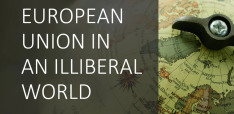The Politics of Nostalgia

Faced with a future that presents itself as non-negotiable, the temptation is to turn towards the past.
When Harry Potter discovers the Mirror of Erised in The Philosopher’s Stone—a mirror that shows us our deepest dreams—he repeatedly returns to it in secret. Each night in its reflection he lives his longed-for life: his parents are by his side, his relatives surround him, and all are smiling. When the wise headmaster Dumbledore discovers Harry’s nostalgic habit, however, he is dismayed. This is no harmless moment of fantasy. “It does not do to dwell on dreams Harry,” he warns, “and forget to live.”
In today’s political climate we would do well to heed Dumbledore’s advice, since Britain is slowly turning into a hall of Erised Mirrors itself. Whichever way we turn, we see, not only an idealised picture of a past that can never be the present, but a past that never was. Since Brexit, the Sun has run a campaign demanding that British passports be returned to their traditional blue covers as a “symbol of British independence.” The Daily Telegraph has called on the UK Government to resurrect the Royal Yacht Britannia (decommissioned in 1997), so that it can “rule the waves” and secure international trade deals for post-Brexit Britain.
These newspapers stare into their mirrors and see the British, unchained from the bureaucracy of Brussels, blue passports in their pockets, the Queen by their side, new-found sovereignty in their lungs, sailing the seven seas again. Aboard the Britannia, carried along by the winds and waves of nostalgia, Britain will once again parade its freedom around the world.
But Brexit and its nostalgic outpouring is part of a broader phenomenon that extends well beyond Britain. Throughout the world, populist political movements are taking shape with nostalgia at their heart. “Make America Great Again,” Donald Trump exclaims. For his supporters, Trump is a breath of fresh air that smells like home. We may not have seen someone like him before in modern politics, but his popularity rests on promising people what they have already seen, or believe that they have seen. The change he offers is not one of innovation but one of restoration—of old values, identities, industries and jobs.
In France, Marine La Pen echoes this call, reminding her fellow citizens of “our glorious history” and laying out a yellow-brick road to its return. In Germany, Frauke Pertry, the co-chair of the rising Alternative für Deutschland, harks back to a historical identity and set of values including homophobia. She recently called for the de-stigmatisation of the German word ‘völkisch’, which signifies a people characterised by a specific race—a word that carries heavy connotations from the Nazi era. Even in Australia, Pauline Hanson, leader of the One Nation Party, has been re-elected to Parliament after a twenty-year hiatus. “When I was growing up,” she said in a recent speech that referred to a mythical moment in time, “we had jobs for everyone.”
Faced with a neoliberal, globalised future that presents itself as non-negotiable, our only strategy seems to be to turn towards the past. Wages stagnate, home ownership plummets, pensions diminish and debt proliferates. So we retreat into safe, warm waters. Feelings of meaninglessness are escaped by memories that give meaning; the discontinuity between past and present is dissolved by re-packaging the past; and the ideal of political revolution is replaced by the alternative meaning of that word: turning in a circle.
Such nostalgia isn’t limited to populists. In mainstream politics, new policies often amount to simplistic ‘bring-backery.’ British Prime Minister Theresa May, clad in Margaret Thatcher memorabilia, calls for the return of grammar schools on the grounds that they were good enough for her and the Leader of the Opposition, so they are good enough for the rest of us. Jeremy Corbyn began his Labour leadership tellingly, with a speech in which large passages had been lifted word for word from another one that was written by Richard Heller in the 1980s. Now the re-nationalisation of the railways is presented as his flagship policy. His rival Owen Smith promised to re-establish the Ministry of Labour that was abolished by Harold Wilson in 1968. ‘Make the old new again’ is the universal cry.
“One is always at home in one’s past”, Vladimir Nabokov writes, and so the alienated move there en masse, not only politically but in cultural matters too. Our hobbies and tastes increasingly become a vehicle to return to past times. Bare bricks coat the walls of upscale homes and restaurants as a simulated sign of decay and a life that has been lived. Vintage clothes show no sign of growing old, and films are relentlessly remade with the motive of invoking the warm, fuzzy feelings of familiarity. Millions of people take to the streets to fulfill their childhood dream of playing Pokemon Go ‘In Real Life,’ while Super Mario is set to be re-released—it’s success all-but guaranteed.
We are like a couple who move into their new apartment and hang family photographs on the wall, hoping to inject its emptiness with a meaning they can understand. Nostalgia is always a yearning to belong, but in this world of shifting sands it is belonging that escapes us. As Dr Tim Wildschut, a senior researcher in psychology at the University of Southampton concludes, “nostalgia compensates for uncomfortable states of mind.”
When nostalgia was initially diagnosed as a physical illness akin to the common cold, it was found most commonly in members of the military. Arising during long, arduous and often miserable campaigns abroad, it was considered a disease of the displaced. Today, the connection between nostalgia and displacement is more complicated. More than something physical it is something temporal—the longing to go back to a different time—but displacement still remains the cause, at least in the modified sense of being marginalized.
This is the condition of our age. No one feels like society is ‘theirs.’ Young people feel forgotten. The elderly feel isolated, pushed into care homes and cut off from society. Alienated by racism and a hostile political discourse, people of colour feel ignored. Alarmed by political correctness ‘gone mad’ as they see it, racists feel under threat. Without, as Zadie Smith writes, “even the perceived moral elevation that comes with acknowledged trauma or recognized victimhood,” the white working class feel forgotten.
With no clear identity, the Left feels lost. Even the dominant Right has taken on a siege mentality, against what it sees as left-wing bias on the Internet, in the media, and in public morality. Perhaps the ‘Shy Tory’ phenomenon of the 2015 UK General Election—in which Conservative voters were allegedly reticent with pollsters about their true voting intentions—is another illustration of this phenomenon: a new majority of underdogs.
Somehow we all feel displaced and pushed to the margins, but there is no unity in this displacement, only a selection of different pasts in which sub-groups take refuge—some more violent than others. Nostalgia comes to us, comforts us, and offers us a well-trodden route back home, to a place where we are always at the centre. If this nostalgia, and its racist divisiveness, is to be overcome, we need a new narrative—and a new politics—of inclusion and empowerment. People need to feel like they belong, but generating this feeling without xenophobia and outward hostility is one of the greatest challenges that we face. As Svetlana Boym, author of The Future of Nostalgia, writes, “it is algia—the longing—that we share, but nostos—the return home—that divides.”
This is not to say that all old ideas and traditions are or should be dead. Drawing inspiration from the past is important, and our lives would be shallower if we could never reminisce. But we can’t take refuge in old ideas or live in past memories; we can’t wrap them around ourselves like warm blankets in tumultuous times; we can’t, as Dumbledore warned, dwell in our dreams and forget to live. Staring into our own Mirror of Erised may bring us comfort, but it only blinds us to the problems that lie behind it—the problems that drive us to the Mirror in the first place.
Samuel Earle is a recent Masters graduate from the London School of Economics, where he studied political theory. This post first appeared on OpenDemocracy.
Photo credit: ToniVC via Foter.com / CC BY-NC-ND


